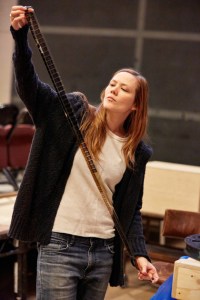The Flick (Dorfman, National Theatre)
Annie Baker’s Pulitzer Prize-winning play is a “mighty achievement”, says our new critic Sarah Crompton
Annie Baker‘s play arrives from New York laden with prizes, including the Pulitzer – and burdened by a reputation for daunting length. "Running time approximately 3 hours 15 minutes. Interval after one hour and 40 minutes" warns the sign on the way into the Dorfman.
Yet those who ignore the acclaim and leave half-way are missing a treat. This is a play rich in humour and insight that reveals its purpose slowly but to devastating and memorable effect.
The setting is a movie theatre in Worcester County, Massachusetts, in the summer of 2012, at exactly the moment when the flicks of the title, the films captured on celluloid and screened via a projector, were about to be replaced by digital. It opens in a darkness illuminated only by the flickering light (and sound) of a 35 mm projector rolling the credits When the lights go up, David Zinn‘s design reveals an empty auditorium that has faded from grandeur into flea-pit squalor, rows of coral seats tipped up waiting for the next showing.
After a while, our protagonists eventually appear, Sam (Matthew Maher) is showing new boy Avery (Jaygann Ayeh) the art of the "walk through" – the act of sweeping up the detritus left by the departed audience. Their conversation is desultory, concerned with banalities and punctuated by a game in which Avery reveals a nerdish knowledge of cinema that can link Michael J Fox to Britney Spears in just six films of separation.
Nothing much happens. But in a series of short scenes, both funny and sad, we learn the story of these lives – and that of Rose, the projectionist, a woman who peppers her sentences with "totally" and "awesome" and expresses the fear that there is something really wrong with her.
There’s something really wrong with everybody on the stage, yet as their anxieties and hopes are exposed, as friendship blossoms and is betrayed in half-sentences and halting prose, we come to understand and care about these people. The performances are staggering; Maher and Louisa Krause (as Rose) are from the original cast and their apparently unselfconscious naturalism, the nuance and subtlety of every glance is breathtakingly revealing. Ayeh, a recent RADA graduate, pretty much matches them each step of the way.
But what makes The Flick so original and captivating, in Sam Gold‘s clear-eyed direction, is the way form really does match content. Its basic story is quite simple, even sentimental – yet it smuggles into its apparent artlessness, themes of performance and reality, of dream and illusion, of the small compromises that people make that destroy them.
Above all, its quiet unfolding makes you watch and listen. Film is different from digital because it has a fraction of darkness between every frame; the viewer has to imagine the moving image. Baker and Gold achieve the same effect, conjuring a stillness that is almost like a painting, rewarding patience, forcing you to pay attention. It’s a mighty achievement.
The Flick runs at the Dorfman Theatre until 15 June.














